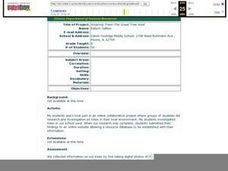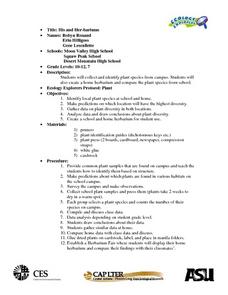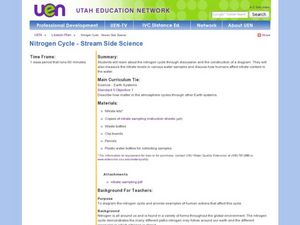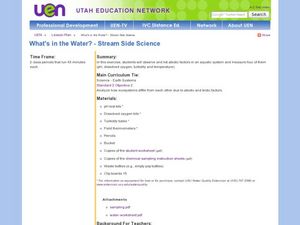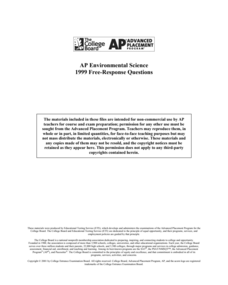Curated OER
Science: Plate Tectonics
Turn your 6th graders into expert geologists with this PowerPoint on plate tectonics. The attached 13 slides include informative facts about the Earth's crust, as well as colorful diagrams. This presentation is great to use as a guide...
College Board
AP® Computer Science: A Picture Lab Student Guide
How do you modify digital pictures? In this lab learners write methods that modify digital pictures. They how to traverse a two-dimensional array of integers or objects, and are introduced to nested loops, binary numbers, interfaces, and...
Population Connection
Lessons From the Lorax
Is progress progressing too fast? So believes the Lorax, the eponymous character from Dr. Seuss's The Lorax. Young environmental science students read the book and debate the arguments of the Lorax and the Once-ler regarding the value of...
PBS
Categorizing Matter | UNC-TV Science
Take the difficulty out of classifying matter with an easy-to-follow activity that makes distinguishing between pure substances and mixtures simple. Scholars explore how matter is grouped between two categories—pure substances and...
Curated OER
Ethics In The Science Classroom - Pine Barrens
Students explain the complexities of environmental decisions, rather than to recreate the actual circumstances and outcome of the original case. They simulate a real environmental case a regarding the Pine Barrens of Long Island, NY.
Curated OER
Science: Seed by Design
Students, working in groups, create "artificial seeds" for a wind dispersal experiment. After trial runs, they redesign their seeds, and re-test them under the same conditions. Finally, they interpret, compare, and evaluate the original...
Curated OER
Science: The Great Tree Hunt
Sixth graders participate in an online, cooperative project researching trees in their local environments for use in an online knowledge game. They take digital pictures of the trees, bark, and leaves. After completing their research,...
Curated OER
Science: Her-bariums Galore!
Young scholars collect and identify plant species and construct herbariums both at school and at home. By gathering data from both locales, they draw conclusions and make predictions about plant diversity. Upon completion of the...
Primary Resources
Science - The Parts of a Flower
Here is what a PowerPoint presentation should look like! This excellent show lets students know what they will be learning about, takes them through nicely-designed examples, leaves room for discussion questions, has a built-in activity,...
Curated OER
Nitrogen Cycle-Stream Side Science
A thorough background and nitrate sampling lab sheet are provided to share with your young scientists. After discussing the nitrogen cycle with the class, you will break them into small groups and show them how to use their inquiry...
Curated OER
Missing Macroinvertebrates - Stream Side Science
Field study groups collect samples of stream water and identify the macroinvertebrates found. Using their data, they calculate a water quality index to rate the health of the stream. They graph their data and discuss the value of a water...
Curated OER
What's in the Water? - Stream Side Science
Here is a complete activity in which young biologists or ecologists test the pH, dissolved oxygen, turbidity and temperature of stream water. The class visits an actual stream and makes observations of the site. They use scientific...
Curated OER
CPO Science - Foundations of Physics
An object in motion will remain in motion, and your physics learners will really get moving by viewing this PowerPoint! They examine each of Newton's laws of motion, learning about force, inertia, acceleration, and equilibrium. They are...
California Academy of Science
Composting: A Scientific Investigation: California Academy of Sciences
Garbage, recycle, compost: Does it really matter where we put our trash once we are done? By making detailed observations over seven weeks, kids will see which materials break down naturally to become a healthy part of the soil, and...
Curated OER
Madame Marie Curie & The Science of Radioactivity
A student-created, yet comprehensive 37-slide presentation on the life and contributions of Marie Curie awaits your upcoming chemists! With plenty of photographs, this resource introduces the woman who is responsible for our early...
College Board
2009 AP® Environmental Science Free-Response Questions
How do genetically modified crops affect agricultural practices? This is one of four environmental questions scholars respond to in an AP® test prep resource. Other topics include methane digesters, water runoff, and nitrogen-based...
College Board
2010 AP® Environmental Science Free-Response Questions
Scientists rely heavily on data to make predictions and find solutions. Young scholars become scientists as they analyze information presented to them to construct responses. They consider scenarios related to air pollution, invasive...
College Board
2007 AP® Environmental Science Free-Response Questions
Mother Nature may have less control of temperature than you think! Young scholars consider the effect urban environments have on local and surrounding temperatures as they respond to one of four free-response assessment questions from...
College Board
2004 AP® Environmental Science Free-Response Questions
Radioactive isotopes have a wealth of uses, but their waste may cause some concern. One of four free-response questions challenges learners to devise a waste removal strategy for medical radioactive substances. Other questions address...
College Board
2002 AP® Environmental Science Free-Response Questions
Are electric motors all they're cracked up to be? Scholars take a stance and use their knowledge to discuss the benefits and disadvantages of the motor as the first question in a series of four. The questions that follow ask about other...
College Board
1999 AP® Environmental Science Free-Response Questions
Pollution is a real concern in most areas of Earth. A four-question AP® assessment has learners analyze data related to water pollution and air pollution as well as consider the pros and cons of recycling. Each question has several...
College Board
2001 AP® Environmental Science Free-Response Questions
Water quality testing often reveals interesting facts about the local environment. Scholars respond to several AP® questions highlighting topics such as air pollution, water pollution, and the spread of disease. Each question requires a...
College Board
2003 AP® Environmental Science Free-Response Questions
One size fits all doesn't seem to be the right approach to endangered species. Using a four-part AP® assessment, learners respond to questions that address environmental concerns such as human population changes, invasive species...
College Board
2006 AP® Environmental Science Free-Response Questions
There is a strong correlation between the carbon dioxide concentration in the air temperature. Scholars offer explanations for the correlation in one of four AP® free-response assessment questions. Their analyses in the other questions...
Other popular searches
- Earth Science
- Physical Science
- Life Science
- Science Project
- Science Space
- Environment Science
- History of Science
- Environmental Science
- Pe Science
- Family and Consumer Science
- Consumer Science
- Social Science








